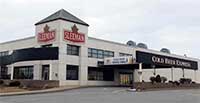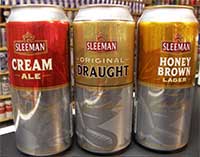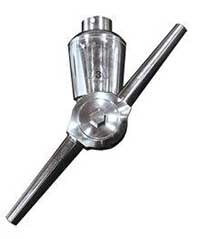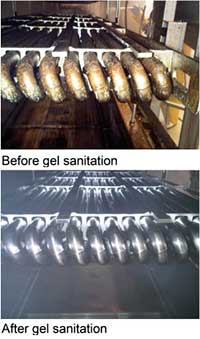Chlorine Dioxide Technology for Improved Beer Quality and Safety at Sleeman
The most abundant ingredient in beer is water, which greatly affects taste. If inferior quality water is used, no amount of skill or technique could make a good product. Water is also critical in the cleaning and rinsing stage of the packaging operation to ensure product quality and safety.
 When Sleeman wanted to package its draught in cans, one of the important steps was to get the packaging right. Considering its draught beer is unpasteurized and free from preservatives, the entire process had to be designed carefully to provide quality and safety.
When Sleeman wanted to package its draught in cans, one of the important steps was to get the packaging right. Considering its draught beer is unpasteurized and free from preservatives, the entire process had to be designed carefully to provide quality and safety.
Sleeman engaged Sealed Air (formerly known as Diversey) and decided to investigate chlorine dioxide to treat the water used in the can rinser. Sealed Air proposed BelloZon chlorine dioxide generation technology from ProMinent Fluid Controls of Guelph, ON, which uses acid-chlorite chemistry with two Sealed Air chemicals: Divoact H-9 and CloSureCentral 7.5, and which safely produces a solution of chlorine dioxide with no free chlorine. BelloZon generators are high quality equipment that meet the stringent German DVGW guidelines for water treatment.
Multiple jets spray chlorine-dioxide-treated water inside the can rinser to wash the insides of the cans to provide the required treatment. The CLO2-treated water is also sprayed inside the lid seamer. An added advantage of this CLO2 treatment is that it keeps the inside of the equipment and the surrounding area clean.
 Sleeman says that treating the can rinse water with Chlorine dioxide helps the water to remain fresh and the beer safe in the can while imparting no smell, no taste and no adverse effect to the product. Further, it also provides a proactive treatment to mitigate the risk of any possible contamination in the water being used for the rinse. The overall treatment for the draught product has been so successful that Sleeman has now extended the same can rinse treatment with chlorine dioxide for all of its other canned beer products.
Sleeman says that treating the can rinse water with Chlorine dioxide helps the water to remain fresh and the beer safe in the can while imparting no smell, no taste and no adverse effect to the product. Further, it also provides a proactive treatment to mitigate the risk of any possible contamination in the water being used for the rinse. The overall treatment for the draught product has been so successful that Sleeman has now extended the same can rinse treatment with chlorine dioxide for all of its other canned beer products.
Cenosillicaphobia, often experienced in pubs, is the fear of an empty glass. Pubs in England, once used to serve beer in a novel mug, one with a whistle baked into the rim of the mug, the whistle being used to summon the barmaid so that customers could get their mugs filled without delay. Some beer enthusiasts like to reason that this practice gave birth to the phrase “wet your whistle.”
About the Authors
Robert Maarse, is Packaging Manager at Sleeman Brewery, Guelph, ON; Bart Schuurman-Hess, is Senior Account Manager with Sealed Air (formerly known as Diversey); Amit Bhatt, P.Eng., is Applications Engineering Specialist, ProMinent Fluid Controls Ltd.

-
 FeaturedRisk management
The Cost of a Breach: What a Cyberattack Could Mean for Food Safety Recalls
FeaturedRisk management
The Cost of a Breach: What a Cyberattack Could Mean for Food Safety Recalls
-
 FeaturedRisk management
Securing the Food Chain: How ISO/IEC 27001 Strengthens Cybersecurity
FeaturedRisk management
Securing the Food Chain: How ISO/IEC 27001 Strengthens Cybersecurity
-
 FeaturedRisk management
Revolutionizing Food Safety Training: Breaking Out of the “Check-the-Box” Mentality
FeaturedRisk management
Revolutionizing Food Safety Training: Breaking Out of the “Check-the-Box” Mentality
-
 GFSI Standards
GFSI 2025: Building Trust, Tech-Forward Solutions, and Global Unity in Food Safety
GFSI Standards
GFSI 2025: Building Trust, Tech-Forward Solutions, and Global Unity in Food Safety
-
 FeaturedFood Safety
Integrated Pest Management: Strategies to Protect Your Brand’s Reputation
FeaturedFood Safety
Integrated Pest Management: Strategies to Protect Your Brand’s Reputation
-
 FeaturedFood Safety Culture & Training
No Open Door Policy: Challenges That Impact Pest Control in Food Processing Plants
FeaturedFood Safety Culture & Training
No Open Door Policy: Challenges That Impact Pest Control in Food Processing Plants



